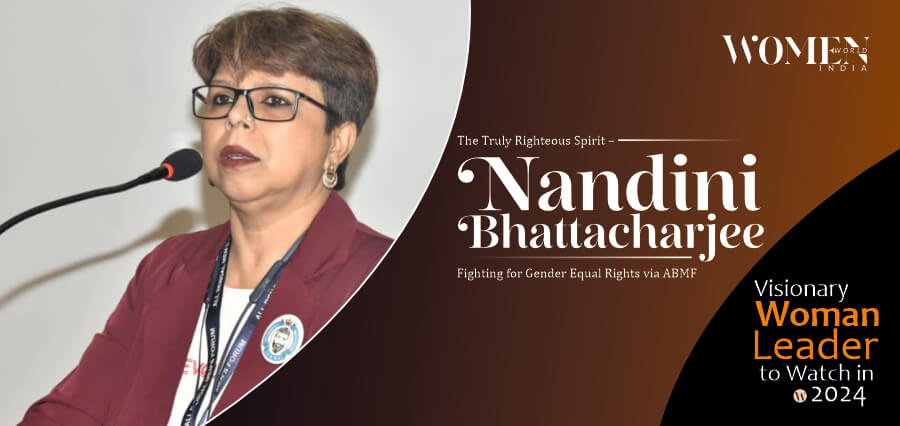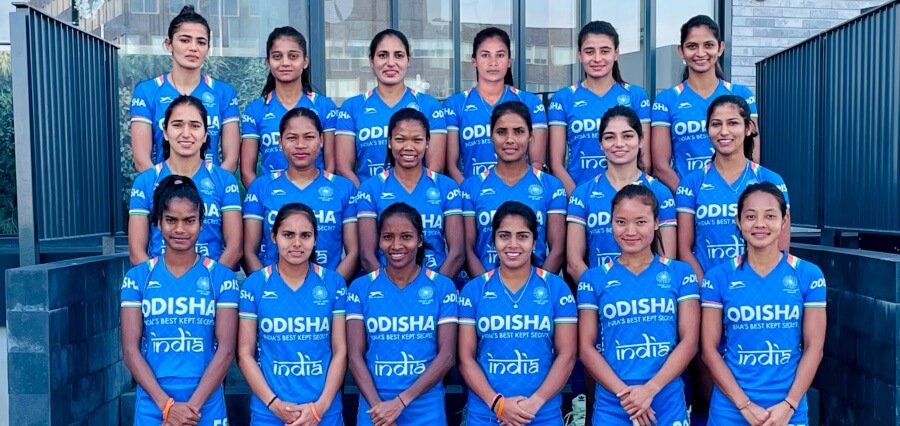If we accept the fact that every coin has two sides, the coin of gender equality is no exception. While the side of women’s rights gathers all the limelight, the other side of the issue–men’s rights–is grossly neglected. The law (skewed towards women’s rights) is often misused to suppress and oppress men’s rights, lives, and well-being. This misuse of the legal system can lead to unfair treatment, false accusations, and a lack of recourse for men who find themselves on the receiving end of such exploitation. So much so that, in 2017, Nandini Bhattacharjee’s journey in men’s rights activism began with a deep-rooted belief in the need for gender-neutral laws and the protection of men’s rights in India.
The Men’s Right Activist, aka MRA at All Bengal Men’s Forum (ABMF), Nandini’s motivation to enter this field stemmed from the realization that Indian society and laws primarily focused on women, neglecting the rights and well-being of men.
Another critical aspect of the discussion surrounding gender inequality is the myth of male privilege. While it is true that men have historically held positions of power and influence, this does not negate the unique challenges and struggles they face. The assumption that all men are privileged and immune to discrimination is a gross oversimplification of a complex societal issue.
The Great Equalizer
Nandini highlights that the imbalance in social support structures and legal frameworks and the rising incidence of false allegations of rape, sexual harassment, and domestic violence against men has fueled her determination to advocate for men’s rights. She asserts, “True equality can only be achieved when the rights and well-being of all individuals, regardless of gender, are protected and respected.” Focusing exclusively on women’s rights while neglecting men’s rights creates an imbalance that perpetuates the cycle of inequality.
To effectively address this issue, Nandini emphasizes the need for a balanced discourse that acknowledges concerns from both sides. “This dialogue should be based on facts, empathy, and a genuine desire to create a more just and equitable society for all,” she adds. Open and honest discussions are essential for identifying and addressing the root causes of gender inequality and working towards a more inclusive future.
This philosophy is central to Nandini and her team at the ABMF. The forum advocates for men’s rights, fights for equal rights, ensures fairness for males, challenges male stereotypes, and addresses societal issues. By fostering an environment where both men’s and women’s rights are recognized and respected, they aim to create a more equitable society for everyone.
“We are committed to providing services, research, advocacy, and thought leadership on all aspects of men’s issues,” says Nandini. “Our organization aims to address the societal stigma and shame that often lead men to isolate themselves. Psychological counselling is our first step before approaching legal hurdles.”
What is more, Nandini is also fighting for a Men’s Commission in India. Nandini argues that a Men’s Commission in India would provide a platform to address the unique issues faced by men, such as toxic masculinity, mental health, and discrimination. Such a body could offer support, resources, and a voice for men, promoting a more balanced and equitable society.
Her advocacy for a Men’s Commission is rooted in the belief that true gender equality can only be achieved through addressing the needs of both genders. By championing the establishment of a Men’s Commission, Nandini is contributing to a broader conversation about gender roles, stereotypes, and the overall well-being of society.
A Constantly Engaging Leadership
To ensure that ABMF remains adaptable and ahead of trends, Nandini says they prioritize continuous engagement with the community through various mediums, including direct talk, TV panel discussions, seminars, musical performances, acts of community service, legal discussions and more. “We actively listen to the evolving needs and concerns of men in society. It allows us to adapt our strategies and initiatives accordingly.” Further, they keep abreast of legal developments and societal trends, she says. “These let us address emerging issues effectively.”
Nandini’s visionary leadership style is widely recognized as an inspirational force behind the achievements of the ABMF. Her approach is defined by inclusivity, collaboration, and empowerment. “Inclusivity, collaboration, and empowerment – these three things define my leadership approach,” says Nandini. She believes in fostering a culture of open dialogue and diverse perspectives within the organization, which is essential for driving meaningful change.
Her team-building efforts focus on creating a supportive and cohesive environment where every member’s voice is valued. “I always encourage teamwork and mutual respect,” she adds. This collaborative spirit helps the team strive toward their common goals related to men’s rights, reinforcing the importance of unity in their mission.
Balancing the Gender Equilibrium
Nandini further emphasizes that striking a balance between expectations and experience is a core principle of ABMF’s Rights group. “We are aware of the diverse experiences and challenges faced by men in society. And we aim to address their expectations and issues through a combination of legal advocacy, psychological support, and community engagement,” she explains. This multifaceted approach ensures that they are not only addressing immediate concerns but also fostering long-term solutions.
Moreover, she insists on the importance of integrating perspectives from men of various backgrounds. “We strive to integrate the perspectives of men from various backgrounds. This lets us ensure that our initiatives are inclusive and relevant,” she states. By valuing diverse experiences, Nandini and her team can create programs that resonate with a broader audience, ultimately enhancing their effectiveness.
Through her leadership, Nandini is not only advocating for men’s rights but also challenging societal norms and stereotypes that hinder progress. Her commitment to inclusivity and collaboration sets a powerful example for others in the field, demonstrating that true change can only be achieved when all voices are heard and valued.
The Role of Education and Awareness
Education and awareness are undoubtedly vital in promoting a better understanding of gender equality. By fostering an environment where individuals are taught to respect and value each other regardless of gender, we can challenge harmful stereotypes and promote a culture of mutual understanding and support. This educational approach is crucial in breaking down the barriers that perpetuate gender inequality and creating a more inclusive society.
Moreover, Nandini emphasizes that the path to true gender equality lies in embracing inclusivity and recognizing the inherent worth and dignity of every individual. “By acknowledging the unique challenges faced by both men and women and working together to address them, we can create a society where everyone has an equal opportunity to thrive and succeed,” she says. This statement underscores the importance of a collaborative effort in achieving gender equality, where both men and women work together to address the challenges they face.
While the ABMF primarily focuses on advocating for men’s rights, it also recognizes the importance of sustainability and environmental responsibility. Nandini and her team have designed the Forum’s operations to minimize environmental impact, actively promoting responsible resource usage within their organization. This includes proper waste disposal, focusing on recycling, using recycled items, reducing the wastage of water, and conserving other natural resources.
By incorporating environmental sustainability into their mission, ABMF demonstrates a holistic approach to social change. They understand that true equality cannot be achieved in isolation from other pressing issues, such as environmental protection and resource conservation. This integrated perspective reflects a broader commitment to creating a better world for all, where gender equality and environmental sustainability go hand in hand. “At ABMF, we are committed to contributing to a sustainable future by integrating principles of environmental responsibility into our activities,” she insists.
Fostering Equal Opportunities
Nandini’s leadership in this regard sets an example for other organizations and individuals who are passionate about creating positive change. By combining education, awareness, inclusivity, and environmental responsibility, ABMF is working towards a future where everyone, regardless of gender, has the opportunity to thrive in a sustainable and equitable society.
ABMF has achieved remarkable success in its mission to advocate for men’s rights, and Nandini highlights their commitment to excellence and innovation. She states that each of their initiatives is transformative, emphasizing that as they learn more every day, they change themselves and society in a more positive way. “We are not only focused on providing legal support, guidance, and representation to men facing various legal challenges, ensuring that their rights are protected and upheld,” she explains. This multifaceted approach not only addresses immediate legal needs but also empowers men to navigate the complexities of the legal system effectively, especially in a landscape where laws can often appear biased toward women.
On the Mission of Holistic Uplifting
However, Nandini emphasizes that ABMF’s mission extends beyond just legal representation. “We aim at a holistic uplifting of men in legal, social, mental, physical, moral, ethical, economic, and many other aspects,” she asserts. This comprehensive focus is what she considers their most transformative initiative, providing continuing benefits for men in various facets of life. By addressing these diverse needs, ABMF seeks to foster a more balanced and equitable society where men can thrive.
Nandini explains that they leverage digital platforms for community engagement, awareness campaigns, and resource dissemination to optimize their services. “With a wide range of technology tools, ranging from digital devices and social media platforms to cutting-edge health equipment, musical platforms, and more, we enhance our outreach and ensure that our services are accessible to a wider audience,” she elaborates. This strategic use of technology not only broadens their reach but also allows them to connect with men who may be in need of support but are unaware of the resources available to them.
Through these initiatives, Nandini and her team at ABMF are not only advocating for men’s rights but also working to create a more inclusive environment where all individuals can find the support they need. By focusing on both immediate legal challenges and broader societal issues, they are paving the way for a future where men’s rights are recognized and valued alongside those of women, ultimately contributing to a more equitable society for everyone.
An All-Inclusive Culture
Nandini emphasizes that ABMF provides a variety of training, mentorship, and personal development opportunities to foster a culture of growth, skill development, and empowerment among its volunteers. This approach empowers volunteers to contribute effectively to their advocacy initiatives. “There is constant encouragement for knowledge sharing, which allows our volunteers and members to learn and grow together, empowering themselves with more skills as well as the men they get in touch with,” she explains. This commitment to education not only enhances the capabilities of the volunteers but also strengthens the overall impact of their advocacy efforts.
As a leader in India’s Men’s Rights activism, ABMF has faced its share of challenges. Nandini recalls one particular instance that tested their resilience: “Our team’s resilience and ingenuity were evident in a case where we successfully advocated for the rights of a man who had been falsely accused and was facing death row punishment.” Through diligent legal representation and community support, Nandini and her team were able to overturn the false allegations, securing justice for the individual and safeguarding the well-being of his dependent family members. This case exemplifies the critical role ABMF plays in protecting the rights of men who find themselves in precarious situations.
Digitally Driving the Dynamic Times
When asked how ABMF has navigated the unprecedented post-pandemic times and adapted its strategies, Nandini explains, “We transitioned our advocacy efforts to digital platforms. With virtual engagement, online resources, and remote support, we managed to continue our services and maintain community connections effectively.” This shift to digitalization has proven essential, as organizations must now operate beyond the physical realm, focusing on digital transformation, constant engagement, and enhancing virtual experiences.
Nandini emphasizes that ABMF has embraced digital platforms for community engagement, awareness campaigns, and resource dissemination. “By prioritizing virtual experiences and digital engagement, we ensure that our services remain accessible and relevant in the digital realm,” she states. This proactive approach allows ABMF to reach a broader audience and engage with individuals who may benefit from their services but are unable to participate in traditional, in-person formats.
Looking to the future, Nandini shares her vision for ABMF, aka the All Bengal Men’s Forum. “We aspire to expand our advocacy efforts, strengthen our community engagement, and drive meaningful legal and societal change to ensure the protection and well-being of men in India,” she concludes. This forward-thinking perspective reflects ABMF’s commitment to not only addressing current issues but also paving the way for a more equitable future for all men in society.





